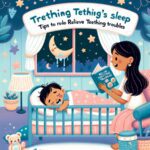The journey of parenthood is filled with many sleepless nights, particularly during the teething phase. The effect of teething on a baby’s sleep patterns can be significant, leading to restless nights and challenging days both for the baby and the parents. Understanding how teething impacts sleep and knowing strategies to cope with these changes can make this developmental milestone less daunting.
Understanding the Effect of Teething on a Baby’s Sleep Patterns
Teething is a normal part of a baby’s growth but can disrupt their regular sleep routines. As new teeth emerge, babies might experience discomfort or pain, which can lead to increased fussiness and difficulty settling down for sleep. This period can start as early as three months and can continue intermittently up to three years of age.
During teething, babies may show signs of distress such as rubbing their gums, drooling more than usual, or bringing objects to their mouth to chew on. This discomfort can understandably lead to more wakeful nights and disrupted sleep patterns. It’s important for parents to recognize these signs and provide comfort to help their babies navigate through this growth phase smoothly.
The Effect of Teething on a Baby’s Sleep Patterns and How to Cope
Though teething is a natural process, it doesn’t make watching your little one struggle any easier. The effect of teething on a baby’s sleep patterns can significantly alter their and your night-time routines. However, there are several strategies parents can employ to ease their baby’s discomfort and promote better sleep during this time.
Firstly, maintaining a soothing bedtime routine can provide comfort and a sense of normalcy for your teething baby. Incorporating gentle gum massages with a clean finger or a cold washcloth can offer relief. It’s also beneficial to offer teething toys that are safe and designed to soothe sore gums. Ensuring your baby’s sleeping environment is comfortable, quiet, and at an ideal temperature can also help. For more on optimizing sleep environments, consider exploring ideal room temperature for baby sleep in winter.
Additional Strategies to Support Your Teething Baby’s Sleep
Aside from addressing the direct discomfort of teething, there are other methods to support your baby’s sleep. White noise machines or lullabies can be effective in creating a calming environment that might help drown out the discomfort noises your baby could make while trying to sleep. For insights into the effectiveness of these aids, check out white noise machines vs lullabies for infant sleep.
Another technique is to be flexible with your sleep training methods. If your baby is struggling to sleep due to teething discomfort, it might be necessary to hold or rock them to sleep more often than usual. While it’s important to try and maintain a routine, adaptability is key during this phase. For comparison of different sleep training methods, you might find comparing sleep training methods for a 6-month-old to be a useful resource.
Teething is indeed a challenging time, but it’s also a temporary phase. By understanding the effect of teething on a baby’s sleep patterns and utilizing coping strategies, parents can help make this period more manageable for their little one. For more detailed strategies on alleviating teething discomfort, consider reading the impact of teething on sleep and how to alleviate it. Remember, every baby is unique, and finding what works best for your baby may take some trial and error. Patience, love, and care are your best tools during this time.
For additional information and strategies on managing sleep challenges beyond teething, consider consulting reputable sources and healthcare professionals who can provide guidance tailored to your baby’s specific needs. Moreover, understanding healthy dental practices during infancy (American Academy of Pediatrics) can also support your baby’s overall well-being during the teething phase and beyond.













